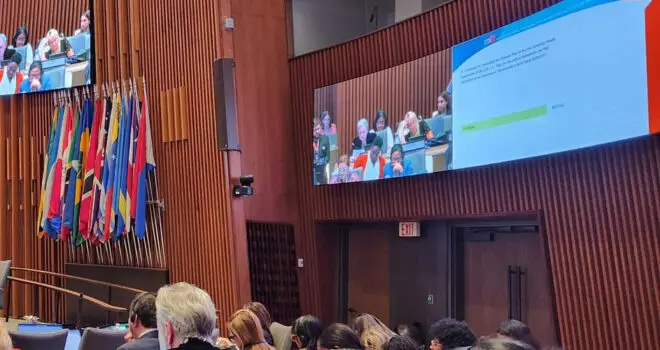On Tuesday 31 January, World Heart Federation’s Alastair White delivered a statement under the Health Systems agenda item at the 140th Session of the WHO Executive Board in Geneva, Switzerland.

The statement was made during discussions on Agenda Item 8.7 – Promoting the Health of Migrants – and addressed:
- The burden of NCDs among migrant and refugee populations
- The challenges in delivering high-quality care to migrants and refugees
- The need for research into chronic conditions in migrant settings
- Recent steps taken by the international community to address migrant health
Alastair joined us for a short Q&A, to discuss why promoting the health of migrants is a key component of the WHF’s advocacy at the Executive Board:
Why is global attention and awareness of migrant health increasing?
The number of people on the move is the highest it’s ever been, with over 244 million international migrants at the end of 2015. Of these, over 21 million were refugees and 40 million were internally displaced persons. Governments, civil society and other stakeholders are increasingly realizing that they must work together to ensure accessible and affordable care for all migrants.
What is the burden of non-communicable diseases (NCDs) among migrants and refugees?
There is a distinct lack of data to allow us a comprehensive understanding of the NCD burden among migrants and refugees, which is why the World Heart Federation is calling for increased investment into research in this area.
However, from existing evidence, we know that there is a significant – and often untreated – NCD burden among migrants in acute crisis settings. Recent studies in refugee and humanitarian settings have demonstrated an NCD prevalence ranging from 19% to over 50% among these populations. In these studies cardiovascular disease and diabetes were found to be the most common chronic diseases.
What are the main challenges in providing health care to migrants and refugees?
There are logistical challenges at every stage of health care delivery. Migrants often fall through gaps in the health system, and may not access health services due to low economic, social and legal integration in the country where they live. Providing reliable care for NCDs is particularly challenging. As chronic conditions, NCDs require regular treatment and continuity of care, which can be difficult to deliver for mobile populations.
This challenge becomes greater still in humanitarian settings, where there are huge disruptions to medical provisions and often a lack of skilled health workers. Nevertheless, despite the difficulties in delivering care, we believe these challenges are surmountable.
What actions are governments taking?
International cooperation is certainly increasing: the United Nations General Assembly organized a high-level meeting in September 2016 on the subject of migrants and refugees, at which the New York Declaration for Refugees and Migrants was adopted. This Declaration paves the way for a Global Compact on Refugees and Migrants in 2018, which is an important step.
Moreover at this Executive Board meeting, several countries have floated the possibility of a Global Framework and Action Plan on the Health of Migrants and Refugees. However as well as progress at the global level, there is also an urgent need for on-the-ground action.
What steps can be taken to improve CVD and NCD health care for migrants?
An important step is for WHO Member States to fast-track migrant-sensitive policies within their national health systems, to make care more accessible to migrants. We also need more targeted research to investigate health-seeking behavior among migrants and to discover which types of programmes are most effective in improving their access to care.
A significant problem within migrant health – as in many areas of development – is a lack of resources. However one innovative approach would be to promote task-sharing and task-shifting. By training non-specialist health professionals and volunteers to diagnose and treat NCDs, we can help more migrants, refugees and displaced people to access and receive care.


